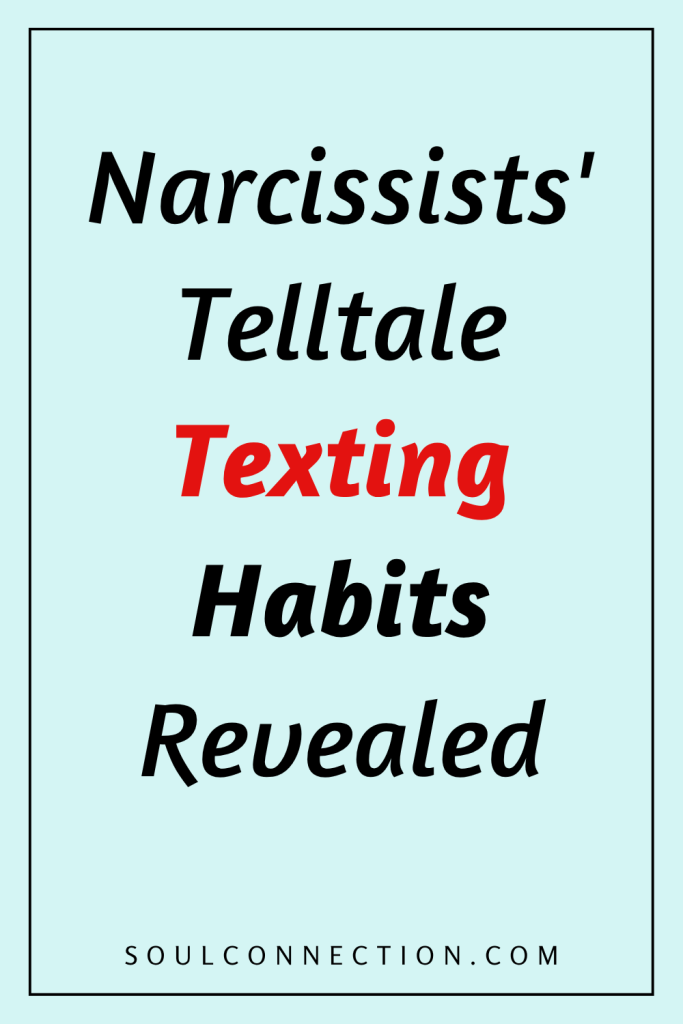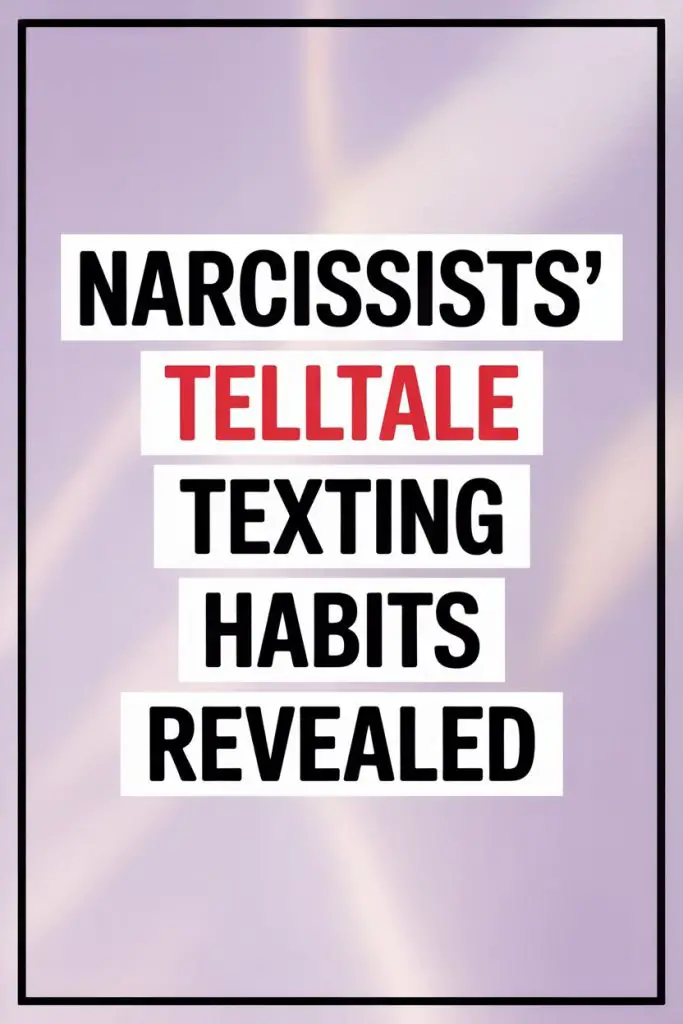For anyone who’s ever squinted at a text thread and wondered, “Is it just me, or is this person a little… much?”—you’re in the right place.
Texting with a narcissist is like trying to salsa dance with someone who insists on breakdancing instead. The beat is off, the moves are confusing, and you’re left feeling like you missed a memo.
Welcome to the cryptic, sometimes frustrating, and oddly predictable world of narcissistic texting habits.
Pull up your chat app and let’s get into the patterns, red flags, and classic traps that narcissists set—one ping at a time.
The Conversation Always Comes Back to Them
Narcissists aren’t just the main character in their own movie. They’re the director, the best boy, and yes, the entire audience clapping for their every line.
Notice how every conversation—no matter where it starts—magically boomerangs back to their job, their weekend, their feelings?
You could text about your cousin’s wedding, and suddenly you’re deep in a monologue about their exhausting work schedule or their plans for next year’s ski trip.
Questions about your life? Rare as a polite teenager before noon. Your news gets a half-hearted “nice” before the spotlight swings back.
If you always feel like an audience instead of a participant, your suspicions may be justified.
Responses Swing Between Gushing and Ghosting
One day, you’ll wake up to a flurry of texts: “You’re amazing!” “How are you so funny?” “I can’t stop thinking about you!” The next, your phone is as silent as a library after closing.
Narcissists are pros at love-bombing—showering you with attention, affection, and emojis that make your phone buzz off the table. Then, just when you start to feel secure, they evaporate.
This hot-and-cold routine isn’t random. It’s a power play. The goal? Keep you guessing, keep you hooked, and always—always—keep you chasing.
Texts Feel Like Little Tests
Ever get a message that’s oddly vague or seems designed to provoke a reaction? Something like, “Wow… didn’t expect that,” or “Guess you’re busy…”
These aren’t innocent comments. Often, they’re bait. Narcissists thrive on validation and control.
A cryptic message is their way of pulling your strings: will you scramble to explain yourself? Will you apologize for being busy? Will you chase after their approval?
If you’re always clarifying, apologizing, or anxiously reading between the lines, you might be stuck in their emotional escape room.
The Guilt Trips Arrive Via Text
Subtle manipulation is a narcissist’s bread and butter, and text is the perfect delivery system.
They might say things like, “I guess I just care more than you do,” or “I would’ve done anything for you, but I see where I stand.”
Suddenly, your reasonable boundaries or normal schedule become evidence of your “selfishness” or lack of care.
The aim: make you feel responsible for their feelings, and keep you glued to their phone screen, desperately trying to make things right.
Compliments Have a Shelf Life
Early on, a narcissist’s texts may read like a highlight reel of your best qualities. You’re “so unique,” “so different from anyone else,” and “the only person who really gets them.”
But when something doesn’t go their way, those sweet nothings turn sour. You’ll notice the compliments dry up, or worse, are replaced with subtle digs: “You used to be fun,” or “You’re not like you were at the start.”
This whiplash isn’t a glitch. It’s a feature.
Boundaries Get Bulldozed
Healthy texting respects boundaries: people have jobs, sleep, friends, and emergencies. Narcissists, on the other hand, expect round-the-clock access to your attention.
“Why didn’t you reply right away?” “Are you ignoring me?” “You always do this.”
You’re allowed to live your life without someone huffing over your response time. If your phone feels less like a tool and more like an ankle bracelet, take note.
Apologies Are Rare and Always Conditional
Find yourself waiting for a narcissist to say “sorry”? Might want to pack a snack.
If an apology comes, it’s usually a spectacle: “I’m sorry you feel that way,” “I’m sorry if you misunderstood me,” or “I’m sorry, but you made me.”
Translation: no actual ownership, just more deflection. The classic “I’m sorry, but…” shifts the blame right back onto you—neat trick, huh?
The Emoji Overload (or Absence) Is Strategic
A narcissist’s texting style can feature either a fireworks display of hearts, winks, and inside-joke emojis—or a frosty, punctuation-only approach.
When they’re trying to win you over, expect love hearts, kisses, memes, and GIFs. It’s a serotonin buffet. When they’re annoyed or want to punish you? “K.”
These shifts aren’t random. They’re cues, designed to keep you off-balance and guessing whether you’re “in” or “out.”
Your Texts Get Ignored Until They Need Something
Reach out about your rough day? Crickets.
Suddenly need a favour, a ride, or an ego boost? Their reply is practically instantaneous.
Narcissists tend to treat relationships as transactional. Your needs only exist when they align with theirs—otherwise, you’ll wait forever for a three-word reply.
They Screenshot, Recap, and Weaponize Your Words
Ever have your own texts quoted back at you in an argument, or find out private conversations have been shared with others?
Narcissists collect screenshots like they’re prepping for a court case. Misspoke in a message? It’ll come back to haunt you—probably out of context, and probably just when it suits their narrative.
If you find yourself double-checking every word, you’re not paranoid—just keenly aware of who you’re dealing with.
Mirroring Turns Creepy, Not Cute
At first, you might be charmed that they use your slang, copy your texting style, or love the same memes. But with narcissists, this goes well past flattery and straight into identity theft territory.
Mirroring is a manipulation tactic: it builds false intimacy quickly, making you feel like you’ve found your “twin flame.”
The catch? It’s surface-level. Their actual interest in your inner world is about as deep as a puddle.
Gaslighting via Text
“You never said that.”
“You’re exaggerating.”
“You’re too sensitive.”
Text threads should, in theory, make it hard for anyone to twist the truth. But narcissists excel at re-writing history, even when the receipts are right there.
Expect them to deny, distract, or reframe events until you start questioning your own memory—or even worse, your sanity.
Rapid Escalation Then Sudden Withdrawal
One week, you’re texting non-stop, making plans, exchanging silly photos. The next, you’re on “read” for days at a time.
This push-pull cycle is classic narcissist behaviour. The highs are thrilling, the lows confusing.
The result? You start craving their attention the way some people crave takeaway on a Friday night.
The Grand Finale: Hoovering with Texts
Ever get a message out of nowhere after things have gone quiet? “Hey stranger…” “Been thinking about you,” or “Miss our chats.”
This is called “hoovering”—as in, they’re trying to suck you back in. The cycle restarts with a little flattery, a lot of nostalgia, and no actual growth. Reply at your own risk.
You Can Spot the Pattern—What Next?
Awareness is powerful, but it’s only step one.
If your texts with someone leave you feeling drained, anxious, or perpetually on the back foot, trust your gut. Emotional whiplash and constant self-doubt are not the price of admission for a relationship.
Turn off read receipts. Take a breather before you reply. Reclaim your phone as a source of joy, not a stress-inducing slot machine.
Sometimes, the healthiest message you can send is no message at all.
Your peace deserves to be seen—and left on “read.”


